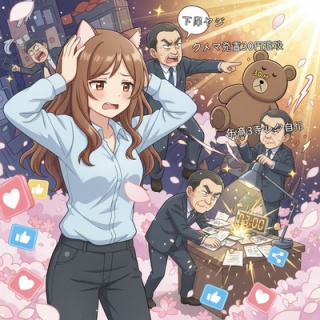SNS
ライブドアブログ内の#SNSタグが付いた新着記事や人気の記事をご紹介。
- このタグで
記事を書く
-

- 私が住んでいるA都市で政治的トラブルにより数日外に出られない状況になった。それを見たらしきBは私とつながっていたSNSで「あー!A駐在じゃなくて良かったー!!」
- 鬼女まとめ速報 -修羅場・キチママ・生活スカッとまとめ-
- 628: 名無しさん@おーぷん 20/04/25(土)16:29:13 ID:Di.2k.L1 世界各地が大変なことになっているので思い出した話。私は以前配偶者の仕事の都合で某国A都市に住んでいた。友人Bも同時期仕事の都合で別の国に転勤。「お互い海外暮らしがんばろうね」と連絡を取り合う仲だった。ある時私が住んでいたA都市で政治的トラブルが起き、市街は騒然。今回のウイルスのロックダウンほどじゃないけど、数日外に出られない状況になり他国のニュースにもなった。
- 投稿日時:2025/11/10 07:39
-

-

-

- 園の担任の先生へのメッセージ、ギャルママのページが自己顕示欲の強い人の写真年賀状やSNSみたいでモヤモヤした
- 鬼女梅‐育児・ママ友・義実家・生活まとめ‐
- 664: 名無しの心子知らず 2019/03/25(月) 21:53:13.93 ID:TuUSdSlX.net 園の担任の先生へのメッセージを親子で書くことになった 先生に渡す前に完成品をちらっと見せてもらったら、ギャルママのページが自己顕示欲の強い人の写真年賀状やSNSみたいでモヤモヤした TANAKA' S FAMILY(仮)と大きな見出し付きで、家族写真が何枚か貼ってあった 子供の写真を数枚貼ってる人はいても、親の写真を複数枚ってのは他にいなかったと思う この他に名刺を貼ってるパパがいて、これもちょっとモヤモヤした
- 投稿日時:2025/11/10 02:39
-

- 【SNS】ツキノワグマ串が大バズり 「駆除して食べる」は対策になるのか? 青森の販売元が語った“本当の課題”
- ガールズVIPまとめ
- 1: 名無しのがるび 2025/11/09(日) 17:18:16.03 ID:??? TID:SnowPig 東北を中心に、全国各地でクマによる被害があとを絶たない。 者数は11月7日時点で13人と過去最悪にのぼり、秋田県には自衛隊まで派遣された。 東京都でもクマが目撃されるなど緊張が高まるなか、SNSでは“熊肉”がにわかに注目を浴びている。 果たして、熊肉料理の普及はクマ被害対策に一役買う可能性はあるのか。 話題のクマ、実は食べると美味しい!? Xで1300万閲覧を記録 10月29日、Xにてヤギ氏が投稿した画像が大きな話題を集めた。 「青森県道の駅フェア&道の駅よこはま大感謝祭」を訪れたというヤギ氏は、そこで販売されていたツキノワグマの串焼き画像をアップ。 お値段は2本800円で、バーベキューをさらにワイルドにしたような豪快な見た目をしている。 気になる味について、ヤギ氏は《下処理が完璧だったのか、臭みなくホロホロ美味かった! 焼肉のタレみたいなのに漬けられてたが、スパイス焼きも美味しそう》《羊肉に似てるかな?》などと食レポ。 意外にもイケるようで、実に8.7万いいねと1300万超の閲覧数を記録している。 感想や見た目のインパクト、クマというタイムリーさから大反響を呼んだこの投稿だが、なかでも目立ったのは、昨今のクマ被害と結びつける声だ。 熊肉が“美味しい”と普及すれば多くのクマが捕獲・駆除され、クマ対策になるのではとして、 《もっと安く売って、個体数を減らせば、街中に出てくる問題解決するのでは?》 《熊害酷いとこもこういうのやればいいと思う》 《熊が美味い…って広まれば…鰻みたいに…こぞって捕獲するようになるかな…?》 などと期待が持たれている。 つづきはこちら
- 投稿日時:2025/11/10 02:35
-

- 園の担任の先生へのメッセージ、ギャルママのページが自己顕示欲の強い人の写真年賀状やSNSみたいでモヤモヤした
- 鬼女まとめ速報 -修羅場・キチママ・生活スカッとまとめ-
- 664: 名無しの心子知らず 2019/03/25(月) 21:53:13.93 ID:TuUSdSlX.net 園の担任の先生へのメッセージを親子で書くことになった 先生に渡す前に完成品をちらっと見せてもらったら、ギャルママのページが自己顕示欲の強い人の写真年賀状やSNSみたいでモヤモヤした TANAKA' S FAMILY(仮)と大きな見出し付きで、家族写真が何枚か貼ってあった 子供の写真を数枚貼ってる人はいても、親の写真を複数枚ってのは他にいなかったと思う この他に名刺を貼ってるパパがいて、これもちょっとモヤモヤした
- 投稿日時:2025/11/09 23:18
-

- 【芸能】北川景子 深夜に「絶望」とSNS投稿… スーパー戦隊シリーズ終了報道のショック伺わせる
- まとめブレイド
- 1: 名無しのがるび 2025/10/31(金) 22:39:30.44 ID:KZd617Aw9 >> 北川景子 深夜に「絶望」とSNS投稿 スーパー戦隊シリーズ終了報道のショック伺わせる 女優の北川景子(39)が30日深夜、自身のX(旧ツイッター)を更新し、「絶望」とつづった。 この日、テレビ朝日系で放送されている特撮ヒーロー番組「スーパー戦隊シリーズ」が、現在放送中の「ナンバーワン戦隊ゴジュウジャー」を最後に終了することが報じられた。 この報道の記事に対して、お笑いコンビ・ドランクドラゴンの塚地武雅が「…」と投稿したXを引用した上で、北川は「絶望」という言葉で心境を明かした。 北川は、テレ朝系のスーパー戦隊シリーズに出演したことはないが、TBS系の〝特撮ヒロインドラマ〟「美少女戦士セーラームーン」で、2003年に女優デビュー。 また、2016年にロックバンド・BREAKERZのボーカルで、タレントのDAIGOと結婚。20年に第1子(長女)、24年に第2子(長男)を出産し、2児の母。子ども向けのドラマ終了報道にショックを受けている様子をうかがわせた。
- 投稿日時:2025/11/09 20:39
-

- SNSで「NHK受信料を払っていない」という声を見ました。義務だと思っていたのですが、最近は自由になったのでしょうか?
- がーるずレポート - ガールズちゃんねるまとめブログ
- 1. 匿名@ガールズちゃんねる http://financial-field.com/living/entry-476574 NHK受信料は自由に払うか決められるものではなく、放送法に基づいて契約義務が定められています。 ■受信料を払わないとどうなる? 「払わない人が多いから自分も大丈夫」と考えるのは、大変危険です。契約義務があるのに支払わない場合はNHKから督促があり、それでも滞納が続く場合は裁判による請求が行われることがあります。 実際に判決によって支払いが命じられたケースもあり、未払いが続くと受信料に加え、滞納分の2倍に相当する割増金が発生する制度も導入されています。 https://up.gc-img.net/post_img_web/2025/11/f65a9a4ca300824e9e822644b75b9b00_16783.webp 2025/11/09(日) 11:44:33
- 投稿日時:2025/11/09 20:39
-

- 立川志らく、高市首相の“接待外交”批判した共産党・志位氏へ「誰にでもできる芸当じゃない」発言に「おっしゃる通り」SNSの声
- まとめブレイド
- 1: 名無しのがるび 2025/11/01(土) 01:02:16.45 ID:BhwYBP7c9 立川志らく、高市首相の“接待外交”批判した共産党・志位氏へ「誰にでもできる芸当じゃない」発言に「おっしゃる通り」SNSの声 《こんなものは外交でも何でもない。異常な対米従属やめ、自主独立の日本への転換が今こそ必要だ》 10月29日、日本共産党議長の志位和夫衆院議員が自身のXを更新。冒頭のように、トランプ米大統領への高市早苗首相の外交姿勢を痛烈に批判したことが話題となっている。 「高市首相は28日、トランプ大統領とともに、大統領専用ヘリコプター『マリーンワン』に同乗して、神奈川県横須賀市の米海軍横須賀基地へと移動。横須賀基地に停泊している原子力空母『ジョージ・ワシントン』の上でおこなわれたトランプ大統領の演説に、飛び入り参加しました。トランプ大統領から『この女性は勝者だ!』などと紹介された高市首相は、米兵たちを前に、右の拳を掲げながら、笑顔で飛び跳ねるパフォーマンスを披露しました。また高市首相は、今回の日米首脳会談で、トランプ大統領をノーベル平和賞に推薦することを伝えています」(政治担当記者) 高市首相が見せたトランプ大統領に対する一連の“接待外交”に、志位氏はXで《米原子力空母で米兵を前に大軍拡を誓約し、飛び跳ねてはしゃぐ。 ガザへのジェノサイドで血塗られたネタニヤフを軍事支援で支えてきた人物をノーベル平和賞に推薦する。正視に堪えない卑屈な媚態だ》と、高市氏を強く非難。冒頭のポストへと続けた。 しかし、これにもの申したのが、落語家の立川志らくだ。 「志らくさんは、Xに志位氏のポストを貼り付け、《いやいや、仰りたいことはわかりますが、あんなに気難しい、ある意味面倒な大統領があそこまで喜んだんだ。ヨイショしまくりで情けないとか色々難癖はつけられるけど、気難しい大物に気に入られるのって大変なんだ。誰でも出来る芸当じゃない。》と切り出すと、 《今回はまず仲良くなること。石破さんみたいに会見が終わったらエスコートもされず、置いてかれちゃうより遥かにいい。今後、国益を損なうようなことになったらその時批判すればいい》 と、少なくともトランプ大統領に取り入ることには成功したと思える、高市首相の外交を評価した。また、自らの体験として、師匠である故・立川談志に気に入られたのも、ぼんやりしていたわけじゃないとして、志位氏は高市首相に嫉妬しているのではないかと批判。続くポストで《共産党がもし同じ立場になったらトランプ大統領に対してどういう対応を取るのか教えてほしい。それを言わないとなんでも反対する党と言われちゃう。さぞ素晴らしい対応をするはずです》と、皮肉を投げかけました」(前出・政治担当記者) この志らくのポストに対して、コメント欄には、 《政権を取ることなんて10000%無いから好きなことが言えるんです》 《いつも外国人と仲良くしろとデモまでやってるのに、仲良くしたら媚びてるとか、はしゃぎすぎとか文句ばかり言う》 《まさにおっしゃる通り。批判するなら「私ならこうした」までセットでないと》 などと、共感の声が多く寄せられている状況だ。 「共産党の反米姿勢は党是みたいなものですから、志らくさんの問いかけに答えることはないでしょう。今回のトランプ大統領の訪日では、共同宣言や共同記者会見はおこなわれませんでした。成功か失敗か、結論づけられるほどの要素もない、というのが実態ではないでしょうか」(前出・政治担当記者) 少なくとも、高市首相への期待感は、まだまだ高そうだ。 >>
- 投稿日時:2025/11/09 19:57
-

- 離婚した父からメール。SNSのID検索したら「虚偽DVを言い立てられ、妻が子供を誘拐して失踪。子供を取り返すべく戦ってる」みたいな設定で呆れた
- 衝撃体験!アンビリバボー|浮気・修羅場・スカッとまとめ
- 335: 名無しさん@おーぷん 20/04/14(火)13:00:44 ID:KW.rp.L3 離婚した父から、唯一残してる連絡手段のアドレスにメールが来てた。なんか私のことを心配してる?らしい「ごはん食べてるか、虐されてないか」みたいな文面。SNSのスクショが添付してあって「お父さんには味方がたくさんいる」「お父さんに逆らうとこの味方がいっせいに動くぞ」とも書いてあった。
- 投稿日時:2025/11/09 18:47
-

-

-

- 園の担任の先生へのメッセージ、ギャルママのページが自己顕示欲の強い人の写真年賀状やSNSみたいでモヤモヤした
- 基地沢直樹-復讐・修羅場・DQN返し【2chスカッとする話まとめ】
- 664: 名無しの心子知らず 2019/03/25(月) 21:53:13.93 ID:TuUSdSlX.net 園の担任の先生へのメッセージを親子で書くことになった 先生に渡す前に完成品をちらっと見せてもらったら、ギャルママのページが自己顕示欲の強い人の写真年賀状やSNSみたいでモヤモヤした TANAKA' S FAMILY(仮)と大きな見出し付きで、家族写真が何枚か貼ってあった 子供の写真を数枚貼ってる人はいても、親の写真を複数枚ってのは他にいなかったと思う この他に名刺を貼ってるパパがいて、これもちょっとモヤモヤした
- 投稿日時:2025/11/09 11:18
-

-

- 【芸能】SNSの「母親やめます」投稿に賛否の声… EXIT・兼近大樹「若者は親になりたがらない人も増えている」
- ガールズVIPまとめ
- 1: 名無しのがるび 2025/11/08(土) 13:51:03.99 ID:/i7OtZTE9 SNSの「母親やめます」投稿に賛否の声、EXIT・兼近大樹「若者は親になりたがらない人も増えている」<ABEMA Prime> EXITが木曜MCを務めるニュース番組「ABEMA Prime」(毎週月~金曜夜9:00-11:00 ABEMA NEWSチャンネル)の11月6日の放送では、SNSで話題を集めた「母親やめます」という投稿を取り上げ、「もう母親なんてやめたいと思っちゃダメですか?」をテーマに議論した。 ■現代の育児観に根付く“我慢の構造” 「母親をやめたい」と打ち明けた投稿には共感とともに批判も多く寄せられ、子育てに追い詰められた母親たちが抱える現実に、スタジオでは“親であることの義務感”や“社会の視線”について多角的な意見が交わされた。 番組MCを務めるEXITの兼近大樹は「個人的になんですけど」と前置きし、「『父親やめたい』も同じように批判を受けると思う。これってやっぱり義務化しているせいだと思う。だから少子化も進んじゃってるのかな」と指摘。 「『仕事やめたい』って言っても、“人に迷惑がかかるだろ”とか“ちゃんとやり抜けよ”って批判がくると思うけど、『タレントやめたい』って言った場合“どうぞ、どうぞ”なんですよ。これって羨ましがられているからだと思う」と分析した。 その上で「母親とか父親って、今羨ましがられてないと思う。『私は我慢できた、なんでお前は辞めちゃうんだ』って、“私はやったのに感”がすごい全体に流れていて、だからこそ今の若者は母親とか父親になりたがらない人も増えている」と、現代の育児観に根付く“我慢の構造”を指摘。 「本来羨ましいものであった方がいいはずなのに…羨ましくないことをみんな我慢してやってるから批判が出る」と持論を語った。 さらに、兼近は自身の経験にも触れ、「僕のお母さんの場合、母親としてはもしかしたらあんまりやってなかったのかもしれないけど、めちゃめちゃ働いていた。寝る間も惜しんで働いている姿を見て、かっけぇなって、お母さんってすげぇなって受け取り方だった」と回顧。 「親としていろんな角度があると思う。いろんな受け取り方をしていい」と述べ、家庭や子育ての多様な形を受け入れる大切さを強調した。
- 投稿日時:2025/11/09 01:57
-

-

- 【MLB】大谷翔平を馬鹿にした大物…身内からも非難轟々 SNSで悲鳴「お前のせいだ」「応援しないで」
- ガールズVIPまとめ
- 1: 名無しのがるび 2025/11/08(土) 22:13:47.69 ID:5aKOQYZ19 大谷を馬鹿にした大物…身内からも“非難轟々” SNSで悲鳴「お前のせいだ」「応援しないで」 ドジャース・大谷翔平投手を煽った世界的スターは身内からも批判が到している。 ラッパーのドレイクはワールドシリーズ第5戦終了後、大谷の三振の画像を投稿した。 直後に2連敗で応援していたブルージェイズは世界一ならず。SNSではブルージェイズファンからも「これでブルージェイズにドレイクの呪いがかかった」と批判を受けた。 今ワールドシリーズでブルージェイズを応援していたドレイクは、第5戦終了後には自身のインスタグラムを更新。ストーリーズ機能で大谷が笑顔の写真とともに「ONE MORE!(もう1回!)」と投稿。 さらに、大谷が空振り三振で崩れ落ちる写真と共に「イェサベージはもうベンチに向かってるぜ」と記し、大谷を煽っていた。ただ直後からチームは連敗していた。 ドレイクといえば、野球に限らず応援を受けたチームや、2ショットを撮影したアスリートに不幸が訪れるというジンクスがある。いつしか、「ドレイクの呪い」と呼ばれるようになった。 その呪いにかかったようにブルージェイズは2連敗。第5戦終了後から呪いを恐れ、「明日は頼むから来ないでくれ」「家へ帰れ」「絶対戻ってくんな」と厄介者扱いされていたが、試合後も「お前のせいだ」「もう応援しないで」と悲しいコメントが相次いだ。
- 投稿日時:2025/11/09 01:08
-

- 【テレビ】堺雅人主演『VIVANT』続編 異例のメディア戦略… 来年放送なのに続々と早め情報公開、SNS発信でファンの関心を維持
- まとめブレイド
- 1: 名無しのがるび 2025/11/01(土) 08:46:05.41 ID:h6PWsP9w9 >> VIVANT続編 異例のメディア戦略…来年放送なのに続々と早め情報公開、SNS発信でファンの関心を維持 俳優・堺雅人主演のTBS系日曜劇場ドラマ「VIVANT」続編(日曜・午後9時)が、来年放送される。放送時期は「来年」としか発表されていないが、すでに多様な形で情報公開がスタート。 先月21日には豪華キャスト26人が発表され、ファンの関心は高まるばかりだ。異例の早仕掛けの宣伝戦略が奏功し、大きな話題を呼んでいる。 世帯平均視聴率19・6%(関東地区、ビデオリサーチ調べ)を記録した最終回から約2年。続編のプロモーションが始まったのは今年6月だった。 同月11日の同局系「THE TIME,」(月~金曜・午前5時20分)に主演の堺が生出演し、待望の続編決定を発表。 前作最終回のラストは乃木(堺)が赤いまんじゅうを目にする意味深なシーンで終わり、直後から続編を期待する声が多く寄せられていた。 続けざまに制作サイドはSNS戦略を開始。7月1日に公式SNSが本格的に再始動し、海に浮かぶ船の写真をアップ。 今作の舞台は「超親日国だけど、日本人にはあまり知られていない」(福澤克雄監督)という“ヒント”が出され、ネット上ではロケ地を予想する声が相次いだ。 さらに3、4週間おきに風景写真などがアップされたことで、前作をほうふつとさせる考察合戦が繰り広げられた。そんな中、8月末に現地での撮影準備中に発生した事故の報道により、図らずも舞台がアゼルバイジャンであることが明らかになった。 そのアゼルバイジャンのロケについて、他局で紹介する“異例プロモーション”も。堺がゲスト出演した10月31日のNHK総合「あさイチ」(月~金曜・午前8時15分)では「某大型ドラマ」とタイトルを伏せながらも約15分間特集し、堺は同国での撮影秘話を明かした。 同月30日にはTBSドラマ史上初となる生成AI映像を導入すると発表し、新しい話題を提供し続けている。 前作との違いは、放送されるのが何月期なのかも公表されていない中で、これらのプロモーションが立て続けに行われていることだ。 従来、ドラマの制作発表はおよそ2か月前で、そこから番組宣伝が行われるパターンが多い。 今クールでいえば、日曜劇場「ザ・ロイヤルファミリー」(後9時)が、8月5日にTBSがタイトルや主演俳優、ストーリーを発表。出演者を徐々に公表していき、10月12日にドラマがスタートした。 一方で、続編も引き続き“秘密主義”を貫いている。前作は役柄やストーリーがベールに包まれた状態で物語が始まった。堺をはじめ阿部寛、二階堂ふみ、松坂桃李、役所広司という主役級のキャストは発表されたが、詳しい内容は明かされないまま。 事前に発表されたのは、メインビジュアルにある「敵か味方か、味方か敵か―この夏、冒険が始まる。」の意味深な一文のみ。初回の放送で初めて、堺が商社マン役であることが判明して、視聴者を驚かせた。 今作では阿部や二階堂ら総勢26人が引き続き出演することは明らかになったが、テロ組織「テント」リーダーのノゴーン・ベキという重要な役どころを担った役所広司の名前はなかった。 ベキは本当にんだのか、前作の海外ロケ地はモンゴルだったが今作でアゼルバイジャンを選んだのはなぜか。ネット上では様々な憶測が飛び交っている。 異例の早さで始まった「VIVANT」の宣伝活動。前作は物語の進行と並行しながら、SNSや公式サイトで伏線のヒントを伝え考察合戦を盛り上げ、高視聴率を獲得した。 その成功体験を、今作では放送前の宣伝段階から用いた格好だ。早いうちからテレビやSNSを通じて小出しに発信を重ね、ファンの注目を維持し続けるのが狙いだろう。 肝心のストーリーには触れずに、ファンの関心を最大限に引き付けたところで、続編の冒険が始まる。
- 投稿日時:2025/11/08 23:47
-

- 松本人志が『DOWNTOWN+』初回生配信で復帰 SNSでは関連ワードが複数トレンド入り…反応はさまざま賛否両論
- まとめブレイド
- 1: 名無しのがるび 2025/11/01(土) 22:56:20.58 ID:zCb/dmn69 松本人志が『DOWNTOWN+』初回生配信で復帰 SNSでは関連ワード複数トレンド入り…反応はさまざま「やっぱり全てを笑いに変える松本人志は面白いな!」「よく恥ずかしげもなく…」 お笑いコンビ「ダウンタウン」の松本人志と浜田雅功が手がけるインターネット配信サービス「DOWNTOWN+(ダウンタウンプラス)」が、1日にスタート。有料配信の中、X(旧ツイッター)では関連ワードが複数トレンド入りするなど、根強い人気を見せつけた。 初回は生配信を行い、松本が久々にファンへ元気な姿を見せたとみられる中、Xでは「松ちゃん‼松ちゃん‼松ちゃんが居る‼」「やっぱり全てを笑いに変える松本人志は面白いな!」「昭和世代としては好きよ‼」「松ちゃんおかえりなさい」「松本さんお元気そうで何より」などとファンによる絶賛コメントが相次いだ。 一方、「松本人志、とにかくカッコ悪いな」「よく恥ずかしげもなく人前に出れるもんだよ」など否定的なコメントも。「DOWNTOWN+」は独自のプラットフォームで有料配信する新サービスで月額1100円、年額1万1000円(いずれも税込み)で視聴可能。 内容は「ダウンタウン」「松本人志」「浜田雅功」の3つのカテゴリーに分かれ、初めに松本のカテゴリーで、松本がプロデュース・出演する新コンテンツと、各カテゴリーの過去のテレビ番組・映画等のアーカイブ作品の配信からスタートする。 >>
- 投稿日時:2025/11/08 20:39
-

- 大事な話を、私にするより先にSNSで公開した彼。話してくれなかったことがショックで、彼に「あなたの口から直接聞きたかった」とメール。…以降2週間、電話にさえ出ない
- 婚外ちゃんねる
- 385: 恋人は名無しさん 2014/08/06(水) 10:42:17.81 ID:eVVODOV6i.net 大事な話を、私に話すより先にSNSで公開した彼 一言も聞いていなかった話なので驚いたし、 話してくれなかったことがとてもショックだった 怒りと悲しみぶつけたくなるのをぐっとこらえて 「SNSで知る前に、貴方の口から直接聞きたかったな~寂しいじゃん笑」と やんわりメールしたら返信がなく、二週間電話にも出てくれない 明らかに怒っているのにその理由すら教えてくれない 私は恋愛経験も少なければ人と喧嘩をしたこともほとんどないので、 男性はこういう怒り方する人が多いのかと思って友人に相談したら 彼はどうしてそんな子供っぽい態度とるの!?と言われて少々面食らった 彼が子供なのか、私の発言がまずかったのか、 彼が何を考えていてどう接すればいいのか分からない
- 投稿日時:2025/11/08 20:39